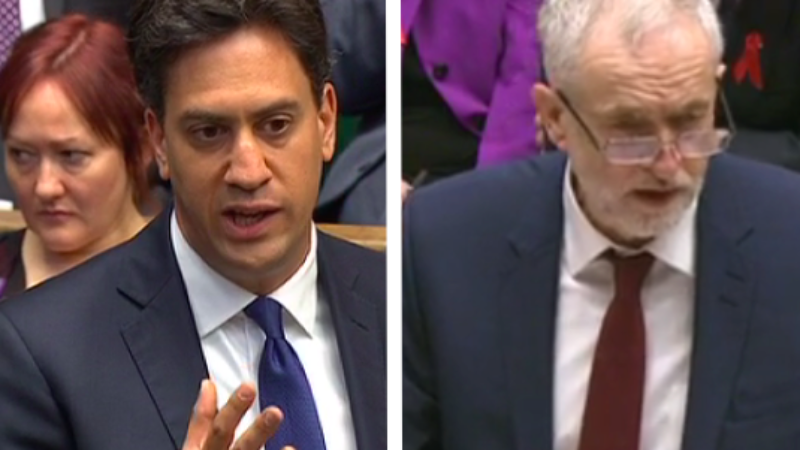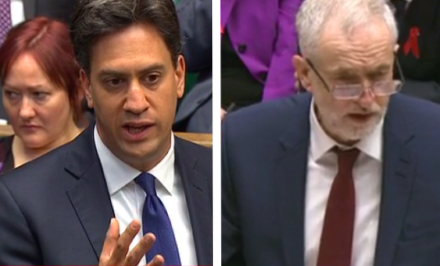

With elections around the corner, Jeremy Corbyn has been keeping Labour activists occupied with a series of policy announcements. While some have been spun as radical by parts of the media, some of them sound very familiar to that of his predecessor. That is not a judgement on their individual merits, because that would require several more blogs, it prompts a question about how much is new in the “new kind of politics”.
Tackling late paying businesses
Today Jeremy Corbyn delivered a speech where he declared war on the “national scandal” of big businesses paying smaller companies late. He is very right to focus on this, and it is disgrace how many household names – M&S, Vodafone and E.ON to name but a few – are said to be part of this problem. Indeed, it makes sense to reach out to small business voters, beyond Labour’s traditional base, given Labour’s position in the polls, but it sounded distinctly familiar.
Ed Miliband, in March 2015, gave a speech to the FSB where he talked about the “national scandal” of late payments, saying how a government led by him would go further than the Blair-Brown administrations, which passed laws so that small businesses could charge interest on money owed to them.
Raising the minimum wage
One of Labour’s proudest achievements in office has to be the introduction of the minimum wage in 1999. Jeremy Corbyn has pledged that a £10 rate would be introduced by 2020, were it down to Labour. He also announced that he would do away with the lower rate for those aged 18-25.
As someone who up until recently was working for minimum wage, before turning 25, the arbitrary nature of these graded wages being tackled feels right.
Miliband pledged in 2014 that a Labour government would raise the minimum wage to £8 by 2020, with an earlier announcement in May of that year that he would seek to link it to average earnings.
Creating incentives to pay the living wage
Labour’s leader has spoken about introducing a maximum earnings limit, which he tied to a ratio of 20 times the lowest paid worker. He calculated the lowest paid as someone on the living wage – which would see a maximum pay of around £350,000.
Miliband sought to provide tax breaks to those who paid the living wage, with a policy of giving companies a 12 month break were they to top up the pay of their lowest earners to a living wage, announced in 2013. His thinking was that this would help keep the benefits bill down, as well as help those worst off.
Nationalising the railways
Corbyn has long been a supporter of re-nationalisation – having it as one of his first policy announcements as leader.
Miliband was also broadly in favour of this, and wanted to ensure there was always a state bidder each time there was a competition for a new franchise. In 2014 he said in an interview with LabourList in 2014:
“It’s something that we’re looking at. My critique of the Tories on this is that they’re being deeply ideological on this. They think that it’s only the private sector that can run railways successfully, whereas something like East Coast – which has been in public hands – has done a good job. I think we’ve got to look at this in a pragmatic way.
National investment bank
Both the present and former leader backed setting up banks across the country to help stimulate the economy. Lib Dem former leader and deputy prime minister Nick Clegg has also backed the idea in the past, designed to to invest in local economies in all regions of the country.
Anti-Assad military action in Syria
Jeremy Corbyn responded to last week’s US airstrikes against a regime airbase with condemnation, warning that they risked “escalating the war still further”.
The Sarin gas attack on civilians, killing many including children, prompted some in Labour to issue statements in support of the US administration’s actions – including deputy leader Tom Watson, and John Woodcock who wrote for LabourList on the issue.
Corbyn’s predecessor Miliband famously stopped Britain entering the anti-Assad side in the war, when then prime minister David Cameron wanted to intervene after a gas attack on civilians in 2013. The use of chemical weapons was a proposed red-line for president Barack Obama along with Cameron, and when Bashar al-Assad used them many thought that would be the starting point for Western intervention in the conflict.
Miliband said to the Commons in a speech: “I do not rule out supporting the Prime Minister but I believe he has to make a better case than he did today on this question”
Of course, the thorny issue of when to support intervention is of course tainted for Labour by the Iraqi invasion – which many now view as a failure.




More from LabourList
‘What Batley and Spen taught me about standing up to divisive politics’
‘Security in the 21st century means more than just defence’
‘Better the devil you know’: what Gorton and Denton voters say about by-election